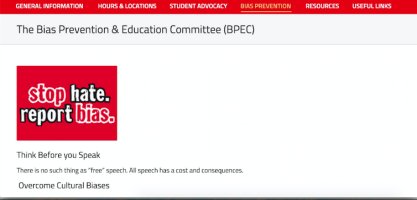Table of Contents
Rutgers Fixes Its Webpage But Not Its Understanding of Free Speech

Before Monday, the webpage of the Bias Prevention & Education Committee (BPEC) at Rutgers University led off with this statement:

Think Before you Speak
There is no such thing as “free” speech. All speech has a cost and consequences.
Then The Daily Caller published an article pointing out the absurdity of announcing that “free” speech doesn’t exist, and the declaration promptly disappeared from the webpage. (Except that it didn’t really, because Google cache conveniently preserved the earlier version.)
The good folks at Rutgers’ BPEC can’t have meant to deny the existence of the First Amendment, which Rutgers, a public university, is legally bound to uphold. The clarification that “[a]ll speech has a cost and consequences” is a bit broad and overdramatic. (“Have a nice day” seems like a pretty safe statement.) But if the Committee meant that controversial speech has a cost and consequences, then it’s probably right. If a student were to say something stupid or thoughtless, or that violated community norms, other students would, and should, push back. Just ask a few of the male students at Old Dominion University and The Ohio State University, whose travails my colleague Sarah McLaughlin described in a post yesterday. And that’s the way it should be: The best response to speech is more speech.
But that, apparently, was not where BPEC was going. Its goal is to eliminate “bias”—an arguably worthy, if unattainable goal. But its definition of bias is fundamentally flawed:
Bias is defined by the University as an act, verbal, written, physical, psychological, that threatens, or harms a person or group on the basis of race, religion, color, sex, age, sexual orientation, gender identity or expression, national origin, ancestry, disability, marital status, civil union status, domestic partnership status, atypical heredity or cellular blood trait, military service or veteran status.
A “verbal” or “written” act is code for speech. (I have no idea what a “psychological act” might be: the evil eye, perhaps?) By stringing together four kinds of “acts” and coupling them with two verbs and two objects, the definition creates permutations of unacceptable behavior that range from common sense to nonsense. A physical act that harms a person may well be illegal. Speech that is a true threat is likewise a matter for the police. A written act that falls into an unprotected category of speech (e.g., a true threat or defamation) could also threaten someone: a Facebook post advocating burning someone’s house down and providing an address because the person is over 40, for instance. But how can a verbal act (speech) of a single student threaten an entire group of military veterans? And what does it even mean for a psychological act to harm someone with an “atypical heredity or cellular blood trait”? Does the policy mean to ban thinking bad thoughts about people with a cystic fibrosis trait or making fun of those with heterochromia or red hair?
BPEC acknowledges that not all “bias acts” will lead to disciplinary action:
Bias acts are often disruptive. However, such acts may not always be in violation of civil, criminal or University codes, and therefore will not result in discipline. Acts of bias may warrant discussion or education about how they affect other members of the University community.
So even if the “bias act” is protected by the First Amendment (at least they acknowledge this is possible), administrators will “educate” the student about the flaws in his or her speech. If the bias is really just a political disagreement, though, what form will this “education” take—and why is it is the government’s business to be supplying it?
Finally, and most chilling, the recommended course of action for dealing with offensive speech based on stereotypes is to report it to university authorities: “If you experience or witness an act of bias or hate, report it to someone in authority. You may file a report on line at www.bias.rutgers.edu and you will be contacted within 24 hours.” I am old enough to remember the Cold War, so cheerful advocacy of turning in one’s peers for diverging from orthodoxy always raises the hairs on the back of my neck.
But even if New Brunswick is not Novosibirsk, the idea that students should first go to a college administrator when they hear something they don’t like—rather than at least try confronting the speaker with better ideas—is profoundly disturbing. As Greg Lukianoff and Jonathan Haidt argue this month in The Atlantic, a major point of college is to teach students how to break down an argument and identify and refute its flaws. Doing that under pressure is a skill that has to be learned to succeed in the types of careers that college students are preparing for. And yet Rutgers students, rather than engaging with ideas that offend them, are apparently supposed to fill out a form and let bureaucrats determine how bad the incident was and how the community should react.
I just figured out what a psychological act that harms a person or a group looks like.
Recent Articles
FIRE’s award-winning Newsdesk covers the free speech news you need to stay informed.

Texas tramples First Amendment rights with police crackdown of pro-Palestinian protests

Here’s what students need to know about protesting on campus right now

Kansas takes a stand for intellectual freedom
